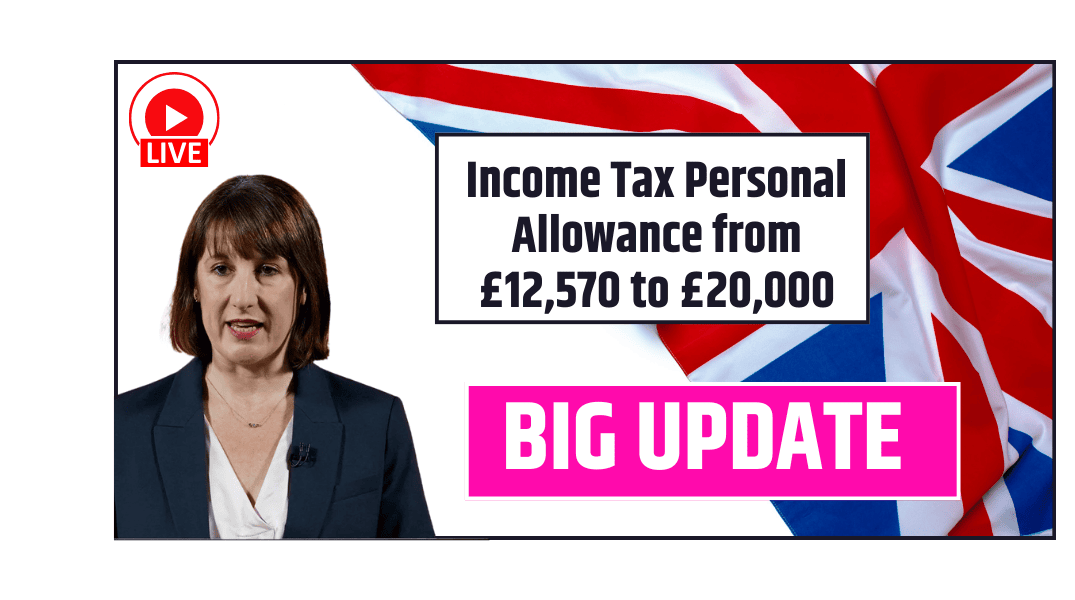Income Tax Personal Allowance from £12,570 to £20,000: Raising the income tax personal allowance from £12,570 to £20,000 would represent a significant shift in the UK’s tax system, with both economic and fiscal implications. Here’s a breakdown of what such a policy change would mean for taxpayers, government revenue, and broader economic impacts.
What Is the Personal Allowance?
The personal allowance is the amount of income an individual can earn each year without paying income tax. As of 2025, the UK personal allowance is set at £12,570 and has been frozen since the 2021–22 tax year.
Raising it to £20,000 would mean individuals could earn up to £20,000 before paying any income tax, effectively increasing take-home pay—especially for low- and middle-income earners.
Estimated Impact on Taxpayers
Here’s a simple comparison showing how take-home pay would change under the proposed allowance increase:
| Annual Income | Tax Paid at £12,570 Allowance | Tax Paid at £20,000 Allowance | Annual Savings |
|---|---|---|---|
| £20,000 | £1,486 | £0 | £1,486 |
| £25,000 | £2,486 | £1,000 | £1,486 |
| £30,000 | £3,486 | £2,000 | £1,486 |
| £50,000 | £7,486 | £6,000 | £1,486 |
Note: These estimates are based on the basic rate of 20% and assume no other deductions or adjustments.
Every basic rate taxpayer would benefit by up to £1,486 per year, while those earning under £20,000 would pay no income tax at all.
Who Benefits Most?
-
Low-income workers: Those earning between £12,570 and £20,000 would see the largest relative gains, potentially paying zero income tax.
-
Middle-income earners: Would also benefit from increased disposable income.
-
High-income earners: While they’d save the same flat amount on their first £20,000 of income, their marginal tax rates beyond that would remain unchanged.
Cost to the Government
This kind of tax cut would come at a significant cost to public finances. According to past estimates from the Office for Budget Responsibility (OBR):
-
Raising the personal allowance by £1,000 costs approximately £5–6 billion per year.
-
Raising it by £7,430 (from £12,570 to £20,000) could cost £35–£45 billion annually, depending on behavioral effects and economic conditions.
The lost revenue would need to be offset through higher borrowing, spending cuts, or increased taxes elsewhere.
Economic and Policy Considerations
Pros:
-
Boosts disposable income, especially for working households.
-
Reduces tax burden for lower earners, potentially improving work incentives.
-
Simplifies the tax system and reduces the number of taxpayers.
Cons:
-
High fiscal cost, impacting public services or national debt levels.
-
Less targeted than benefits—higher earners receive the same tax break as lower earners.
-
May worsen income inequality in the long term if not paired with progressive measures.
Alternative Approaches
Some economists argue that if the goal is to support low-income households, increasing targeted benefits (like Universal Credit) or expanding tax credits may be more cost-effective and equitable than across-the-board tax cuts.
Others advocate for gradual increases to the personal allowance over several years to reduce fiscal shock.
Raising the personal allowance to £20,000 would undoubtedly help working families by increasing take-home pay, but it also carries a hefty price tag. Policymakers would need to weigh the trade-offs between supporting households and maintaining fiscal responsibility.


